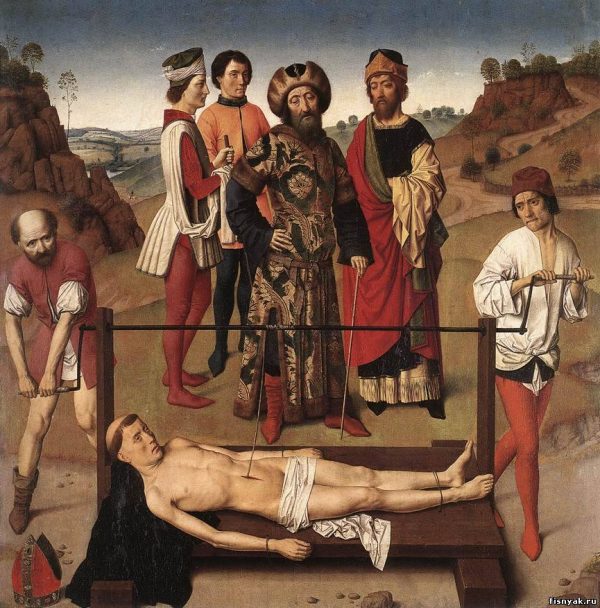Yes, quite often repentance is understood as self-flagellation and self-condemnation, consistent long-term and extremely painful (which is a prerequisite) admitting oneself to being completely and absolutely wrong and very bad. A significant part of penitential prayers is based on such rhetoric, sometimes using exceptionally strong imagery: “For just like a swine lying in the mud, so I serve sin”, “From sullied lips, from an abominable heart, from a tongue impure, from a soul defiled”, etc. Everyone who read it remembers.
It entered the language, into the mass consciousness. When one reads about someone “repenting”, one imagines how they beat themselves in the chest, tear their shirt, knock their head on the ground, in other words they are humiliated in every possible way and suffer. Suffer terribly.
Actually, a strong connection has formed in people’s minds that “repentance” equals “suffering”. Everyone remembers Eustace the Dragon from the “Chronicles of Narnia” whose skin was peeled off and everyone remembers that he was in pain too.
There is even an idea, which is usually not expressed aloud, that the more painful is the better. Repentance is thus more effective. The more you treat yourself like dirt and the harder you criticize yourself is the better. It means that you have repented.
No, we, of course, all read that repentance is a joyful process, some even remember the words “joyful grief”, which sound like something only saints could do, some special people, not us, but someone better. We are left with repentance, which we read like “we are left with suffering”.
Everything in the world can be divided into two groups: not even good and bad, but valuable and worthless.
The valuable is good in itself, no matter what. In fact, the only valuable one is God, Who is the source of everything precious. Everything else can be valuable in relation to Him. People are of value, because they are loved by God and were redeemed by Him. Even very bad people. Even completely disgusting ones are still valuable.
There are useful things. They can be good if something valuable is done with their help. Say, art. It can lead to God, purify a person, open their eyes to something, and improve them. On the other hand, it can trample down in the mud and lead to despondency and anger. Or health, for example. Someone will be grateful due to physical usefulness and will try to perform praiseworthy deeds, but others will see their power as a reason for pride and humiliating the weak.
Suffering is among precisely useful things, not valuable. God does not wish evil to anyone, God does not want His loved ones to suffer. God does not need our suffering in itself at all. Moreover, Jesus wept, seeing how Maria was grieving for Lazarus. That is, God understands our suffering, and He does not like it. Actually, there is only one source in the world that wants a person to suffer. This source is called an enemy. The enemy is the one who wants me to be ill, so that I suffer. He appreciates my suffering. However, God Who loves me does not value it.
Still suffering sometimes can be useful. It can teach a person endurance. It can even be necessary, one can overcome some very bad addictions only through breaking and suffering. This will be useful.
I once had a friend who was a weight lifter. He aspired to have a perfect form of biceps, triceps and abdominalses. He told me that when muscles exceed the limit of the loading, they crack. The cracks are microscopic, but still the tired muscles hurt, because of them. These cracks must be filled with liquid so that they not only grow together, but increase muscle mass. An athlete acquires the desired form through such periodic self-injuring. Therefore, gym is not very effective for those who do not eat properly. The cracks will grow together, but the biceps will not grow in size.
Most importantly, a person will hurt in vain.

Photo from http://photoshare.ru/photo2780609.html
Suffering itself is worthless. Breaking without leaving a bad addiction is just pain that does nothing and does not lead anywhere. Hangover is painful, but it does not cure from anything. Mental pain can simply drive a person insane. No mother would be happy if her child suffered for no reason. Our self-flagellation does not bring God joy either, I believe.
Therefore, we are called to mindfulness: what comes from our suffering? So we called ourselves names, became disappointed with our own strength, and shed tears every night just like the Psalmist. What is the point? Have we left any sins? Or have we acquired virtues? Why did we suffer, if the only result is tears on the pillow?
Or we are experiencing humiliation and resentment from people, but do they themselves make us better? We are silent and patient, thinking that we are fulfilling the commandment, but maybe, if we ponder on it, we just gather hatred and despondency? Or are we secretly arrogant over the greatness of the suffering that we have endured, thinking that we are not like others with such background?
Sometimes one can hear pastoral teachings that too easy, too full, too unproblematic life corrupts a person, makes them stout and slow to answer God’s call. There is truth here. Pampered and spoiled people may not be ready to work hard for the Kingdom of Heaven. But do suffering, hunger, disease, bad relationships and loneliness make a person automatically stronger and better? No, suffering can break a person or they can become arrogant, or fall into hatred or apathy.
Therefore if you hear someone encouraging you “to suffer”, do not be fooled. Suffering is inevitable, such is our sinful world. But we are called by God not to pain, we are called to Love and to work, to serving each other.
















